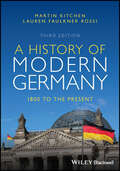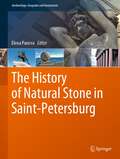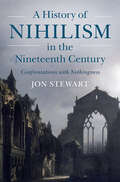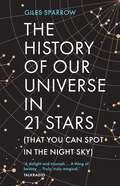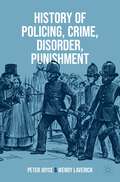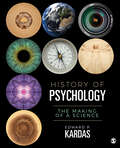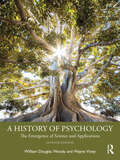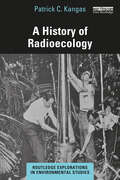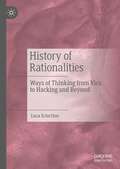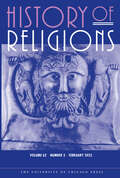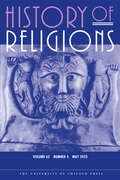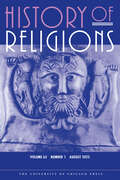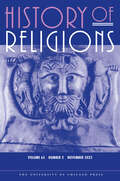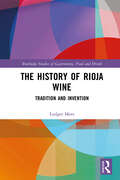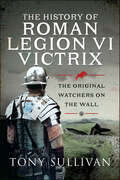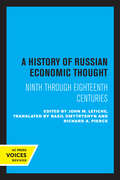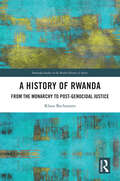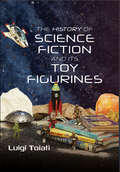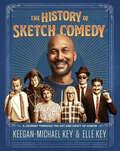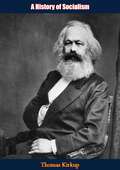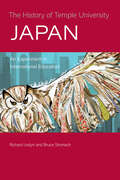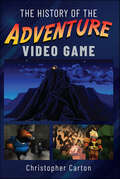- Table View
- List View
A History of Modern Germany: 1800 to the Present
by Martin Kitchen Lauren Faulkner RossiA HISTORY OF MODERN GERMANY A History of Modern Germany provides a comprehensive account of the social, political, and economic history of Germany from 1800 to the present. Written in an engaging and accessible narrative style, this popular textbook offers an expansive view of the nation’s complex and fragmented past, tracing the development of the German national consciousness through Napoleonic rule, the unification of Germany, the German Empire, the Weimar Republic, the Third Reich, post-war division, the collapse of Communism, reunification, and the first two decades of the 21st century. Throughout the text, the authors discuss the tensions prompted by structural changes within Germany, long-term shifts in demographics, social and economic reforms, and more. Now in its third edition, A History of Modern Germany offers richer coverage of German cultural history, the German Democratic Republic, modernization, class, religion, and gender. Updated chapters explore continuity in imperial projects from Bismarck to Hitler, memory and commemoration since 1945, the distinct but intertwined histories of the two Germanys between 1949 and 1989, and the experience of diversity after the Second World into the post-unification era. A History of Modern Germany: 1800 to the Present, Third Edition is an excellent textbook for undergraduate students taking courses in modern German history or modern European history as well as general readers with an interest in the subject.
The History of Natural Stone in Saint-Petersburg (Geoheritage, Geoparks and Geotourism)
by Elena PanovaThe book introduces readers to the heritage of St. Petersburg, sharing the geological history of a unique city, a world heritage site, and part of the UNESCO list. It also explains the role of small towns and fortresses near St. Petersburg, whose stone decoration played an essential role in the city’s evolution and was key in the history of neighboring cultures. The book also describes the main architectural symbols of St. Petersburg, such as the Alexander Column, the Bronze Horseman, the Peter and Paul Fortress and more. In addition to five guided tours of the city center, it offers descriptions of historic quarries, some of which are now open-air museums.
The History of Our Universe in 21 Stars: (That You Can Spot in the Night Sky)
by Giles SparrowPreviously published as A History of the Universe in 21 Stars.'REVISED AND UPDATED ___'A wonderful book about the science, history and mythology of 21 stars (and 3 impostors).' Dr David WhitehouseLook up on a clear evening, and you'll see thousands of stars shining in the night sky, each telling a story of their own. With star maps to help easily identify key celestial bodies, astronomer Giles Sparrow takes 21 stars (and three impostors) to look at what each pinprick of light can tell us about the birth, life and death of our universe.From red giants to supernovae and from stellar cities to our own Sun, The History of Our Universe in 21 Stars shows how the lights we see in the sky can help us unravel the mysteries of the cosmos.'Beautifully written and extremely accessible ... It's extremely difficult to put down! Gemma Lavender
History of Policing, Crime, Disorder, Punishment
by Peter Joyce Wendy LaverickThis engaging textbook provides a broad and unique coverage of the key historical events that shaped ideas in criminology, criminal justice and policing from the late seventeenth century to the early twenty-first century in England and Wales. It vividly illustrates the multi-disciplinary nature of criminology and penology by providing important insights into the social and political issues that shaped the development and operations of the criminal justice system and its responses to both crime and disorder. Using key text boxes, this book highlights key people, theorists, foundational principles and events throughout. Part One discusses the nature of crime and forms of punishment between 1689 and 1750 and the penological concerns regarding the aims of punishment. Part Two focuses on crime and disorder between 1750 and 1850, examining the impact of urbanization on criminal activity and it considers the background and state responses to key episodes of public disorder. Part Three covers the development of policing 1689-1856 and the contribution to policing made by reformers and the implementation of police reform. Part Four deals with a number of issues affecting crime and punishment between 1850 and 1920 including episodes such as Irish Home Rule within the context of ‘high policing’. It evaluates changes to the nature and role of prisons that occurred in this period. This student-friendly book contains end of chapter questions which summarise and enable further discussion.
History of Psychology: The Making of a Science
by Edward P. KardasHistory of Psychology: The Making of a Science provides students with a comprehensive overview of the formulation of the field of psychological science. Starting with a chapter on 21st Century Psychology and then jumping to the dawn of civilization, author Edward P. Kardas is able to make connections between early understandings of human behavior with our current understandings and interpretations of psychological research. Through highlighting the zeitgeist of the era and making connections to the related fields of philosophy, computational science, biology, and social science, students will have a deeper understanding of how and why the field has formed in its current landscape and a sense for where it’s headed next.
History of Psychology: The Making of a Science
by Edward P. KardasHistory of Psychology: The Making of a Science provides students with a comprehensive overview of the formulation of the field of psychological science. Starting with a chapter on 21st Century Psychology and then jumping to the dawn of civilization, author Edward P. Kardas is able to make connections between early understandings of human behavior with our current understandings and interpretations of psychological research. Through highlighting the zeitgeist of the era and making connections to the related fields of philosophy, computational science, biology, and social science, students will have a deeper understanding of how and why the field has formed in its current landscape and a sense for where it’s headed next.
A History of Psychology: The Emergence of Science and Applications
by William Douglas Woody Wayne VineyThis seventh edition of A History of Psychology: The Emergence of Science and Applications traces the history of psychology from antiquity through the early twenty-first century, giving students a thorough look into psychology’s origins and key developments in basic and applied psychology. It presents internal, disciplinary history as well as external contextual history, emphasizing the interactions between psychological ideas and the larger cultural and historical contexts in which psychologists and other thinkers conduct research, teach, and live. It also has a strong scholarly foundation and more than 400 new references. This new edition retains and expands the strengths of previous editions and introduces several important changes. The text features more women, people of color, and others who are historically marginalized as well as new sections about early Black psychology and barriers faced by people who are diverse. It also includes expanded discussions of eugenics and racism in early psychology. There is new content on the history of the biological basis of psychology; the emergence of qualitative methods; and ecopsychology, ecotherapy, and environmental psychology. Recent historical findings about social psychology, including new historical findings about the Stanford Prison Experiment, Milgram’s obedience research, and Sherif’s conformity studies, have also been incorporated. Continuing the tradition of past editions, the text focuses on engaging students and inspiring them to recognize the power of history in their own lives, to connect history to the present and the future, and to think critically and historically.
History of Rabies in the Americas: Insights to Specific Cross-Cutting Aspects of the Disease in the Americas (Fascinating Life Sciences)
by Charles E. RupprechtRabies is one of the oldest known pathogens, is incurable, and has the highest fatality rate of all infectious diseases. The Americas is the only region with bat rabies virus, including vampire bat rabies. The region is rich in cultural references and notable for many discoveries in the field, including the current vaccine potency test, diagnostic assay, conception of oral vaccines for wildlife, the first human survivor and the first successful canine rabies program executed at a broad level. Rabies remains the most important viral zoonosis, with tens of thousands of human fatalities and tens of millions of exposures annually, which can be used to model for other pathogens, such as COVID-19. There is an international effort to eliminate human rabies caused by dogs over the next decade, and the Americas represent the primary region with the greatest proof-of-concept evidence to accomplish this goal. This two-volume set addresses the medical history and modern results of rabies in countries throughout the Americas, including the implications of and on cultural, economic, sociological, and research developments in the region. Volume I presents an overview of concepts critical to the study of rabies in the region, including evolutionary aspects, reservoir ecology and control, elimination efforts, vaccine development, and disease hallmarks and progression. It also analyzes the long-term cultural, social, and economic impacts of the disease in the Americas.
A History of Radioecology (Routledge Explorations in Environmental Studies)
by Patrick C. KangasThis book presents a history of radioecology, from World War II through to the critical years of the Cold War, finishing with a discussion of recent developments and future implications for the field. Drawing on a vast array of primary sources, the book reviews, synthesizes and discusses the implications of the ecological research supported by the Atomic Energy Commission (AEC) of the United States government, from World War II to the early 1970s. This was a critical period in the history of ecology, characterized by a transition from the older, largely descriptive studies of communities of plants and animals to the modern form of the science involving functional studies of energy flow and mineral cycling in ecosystems. This transition was in large part due to the development of radioecology, which was a by-product of the Cold War and the need to understand and predict the consequences of a nuclear war that was planned but has never occurred. The book draws on important case studies, such as the Pacific Proving Grounds, the Nevada Test Site, El Verde in Puerto Rico, the Brookhaven National Laboratory and recent events such as the nuclear disasters at Chernobyl and Fukushima. By revisiting studies and archived information from the Cold War era, this book offers lessons from the history of radioecology to provide background and perspective for understanding possible present-day impacts from issues of radiation risks associated with nuclear power generation and waste disposal. Post-Cold War developments in radioecology will be also reviewed and contrasted with the AEC-supported ecology research for further perspectives. This book will be of great interest to students and scholars of radioecology, environmental pollution, environmental technology, bioscience and environmental history.
History of Rationalities: Ways of Thinking from Vico to Hacking and Beyond
by Luca SciortinoOver time, philosophers and historians of science have introduced different notions of 'ways of thinking'. This book presents, compares, and contrasts these different notions. It focuses primarily on Ian Hacking’s idea of 'style of reasoning' in order to assess and develop it into a more systematic theory of scientific thought, arguing that Hacking’s theory implies epistemic relativism. Luca Sciortino also discusses the implications of Hacking’s ideas for the study of the problem of contingency and inevitability in the development of scientific knowledge
History of Religions, volume 62 number 3 (February 2023)
by History of ReligionsThis is volume 62 issue 3 of History of Religions. The first academic journal devoted exclusively to comparative religious history, History of Religions has set the standard for the study of religious phenomena from prehistory to modern times. HR publishes fresh and insightful scholarship that is engaged both with particular traditions, places, and times and also speaks to broader methodological and/or theoretical issues in the study of religion. It encourages critical conversations in the field with review articles and comprehensive book reviews by distinguished scholars.
History of Religions, volume 62 number 4 (May 2023)
by History of ReligionsThis is volume 62 issue 4 of History of Religions. The first academic journal devoted exclusively to comparative religious history, History of Religions has set the standard for the study of religious phenomena from prehistory to modern times. HR publishes fresh and insightful scholarship that is engaged both with particular traditions, places, and times and also speaks to broader methodological and/or theoretical issues in the study of religion. It encourages critical conversations in the field with review articles and comprehensive book reviews by distinguished scholars.
History of Religions, volume 63 number 1 (August 2023)
by History of ReligionsThis is volume 63 issue 1 of History of Religions. The first academic journal devoted exclusively to comparative religious history, History of Religions has set the standard for the study of religious phenomena from prehistory to modern times. HR publishes fresh and insightful scholarship that is engaged both with particular traditions, places, and times and also speaks to broader methodological and/or theoretical issues in the study of religion. It encourages critical conversations in the field with review articles and comprehensive book reviews by distinguished scholars.
History of Religions, volume 63 number 2 (November 2023)
by History of ReligionsThis is volume 63 issue 2 of History of Religions. The first academic journal devoted exclusively to comparative religious history, History of Religions has set the standard for the study of religious phenomena from prehistory to modern times. HR publishes fresh and insightful scholarship that is engaged both with particular traditions, places, and times and also speaks to broader methodological and/or theoretical issues in the study of religion. It encourages critical conversations in the field with review articles and comprehensive book reviews by distinguished scholars.
The History of Rioja Wine: Tradition and Invention (Routledge Studies of Gastronomy, Food and Drink)
by Ludger MeesThe History of Rioja Wine offers an informative, chronological and in-depth account of Rioja wine from the mid-nineteenth century to the present. This book illuminates the fascinating and largely unknown success story of Rioja wine. Drawing on illustrative sources, the volume traces the economic, social, cultural and political evolution of Rioja wine from the 1850s to the present day, concluding with a reflection on the lesson its appealing success story offers to any lover of history and wine. The book is adorned with historical photographs throughout, the majority previously unpublished. An ideal companion both for students interested in Spanish history and wine enthusiasts more generally, this volume offers readers the opportunity to uncork the secrets of Rioja’s wine.
The History of Roman Legion VI Victrix: The Original Watchers on the Wall
by Tony SullivanThis is the first book to detail the history of the Sixth Legion in Britain, describing in rich detail their weapons and armor, as well as the legion's impact on the region's warfare and contemporary battles. This is the first in depth study on the history of Legio VI Victrix in Britain. Brought over from Germany in 122 to assist in the building of Hadrian’s Wall the Sixth Legion remained in Britain until the end of Roman rule. The book will investigate the changing military organization, weapons and warfare as well as the many auxiliary units posted in the north of Britain. We will meet members of the Sixth Legion known from inscriptions and literary sources. From lowly legionaries helping to build Hadrian’s or the Antonine Wall to Pertinax, tribune of the Sixth, and destined to become Emperor. Case studies will include a praefectus castrorum, Lucius Artorius Castus, along with the legionary bases at York and Corbridge. The men of the Sixth witnessed the tumultuous, and often bloody, history of Roman Britain: the border shifting back and forth under Antoninus; barbarian incursions and army mutinies under the murderous Commodus; the bloody civil war against Septimius Severus and the subsequent invasion of Caledonia. In the last century of Roman rule, the Sixth supported several rival emperors from Constantine the Great, Magnus Maximus until finally Constantine III. The journey will end with a discussion of the likely fate of the Sixth in the early fifth century after the end of Roman authority. A must read for anyone interested in the evolution of the Roman legion, the empire or Roman Britain in particular.
A History of Russian Economic Thought: Ninth through Eighteenth Centuries
by A. I. PashkovThis title is part of UC Press's Voices Revived program, which commemorates University of California Press’s mission to seek out and cultivate the brightest minds and give them voice, reach, and impact. Drawing on a backlist dating to 1893, Voices Revived makes high-quality, peer-reviewed scholarship accessible once again using print-on-demand technology. This title was originally published in 1964.
A History of Rwanda: From the Monarchy to Post-genocidal Justice (Routledge Studies in the Modern History of Africa)
by Klaus BachmannA History of Rwanda: From the Monarchy to Post-genocidal Justice provides a complete history of Rwanda, from the precolonial abanyiginya kingdom, through the German and Belgian colonial periods and subsequent independence, and then the devastating 1994 genocide and reconstruction, right up to the modern day. Based on extensive archival research, this book provides new insights and corrects many popular stereotypes about Rwanda, aiming to go beyond the polarized and heated debates focused on the genocide and the events that followed. Readers will get a clear and broad picture of Rwanda’s history and the social and political contexts that have defined the county from the pre-colonial period onwards. Embedding Rwanda’s history in the regional context, this book avoids simple moral judgements and instead shows where and when Rwanda differed from its neighbours and how the country’s history fits into larger debates about colonialism, genocide, ethnicity, race and development. Offering a full and balanced exploration of Rwanda’s rich and paradoxical history, this book will be an important read for researchers and students of African history, genocide studies, transitional justice, colonialism, and political and social anthropology.
The History of Science Fiction and Its Toy Figurines
by Luigi Toiati"This eye-opening book deserves a spot on the bookshelves of anyone who not only enjoys collecting, but also has a great interest in all facets of the history of our hobby." — Toy Soldier Collector Science fiction, as the name suggests, is the combination of science and fantasy. In addition to a literary form, it also encompasses film, TV, comics, toys and our beloved toy astronauts, or other figures such as aliens, monsters and other playable genres. The term science fiction was coined by publisher Hugo Gernsbach around the first decades of the last century to refer to the predominantly 'space' adventures covered in his magazines. Space invaded radio, cinema, TV, and consequently for a long time toy figurines were predominantly space-related, later evolving into other themes. This lavishly illustrated book covers both the history of literary science fiction, following in the footsteps of contemporary official criticism, and toy figurines inspired by science fiction. You will also find several other themes, such as the link between science fiction figures and cinema, radio, TV, comics, and more. Luigi Toiati offers to both guide the reader on an often-nostalgic walk through science fiction in all its various forms, and to describe the figurines and brands associated with it.
A History of Ship Launches and Their Ceremonies
by George Hodgkinson"This is an interesting and informative book about a shipbuilding process that might be considered routine. Far from it. This fine book is full of centuries of launching methods, ceremonies, superstitions and mishaps." — PowerShips Throughout history, man has been performing rituals at the launch of a new ship to seek supernatural or divine protection for his ship and those who will sail in her. The form of the ritual varies according to local custom and religion: from the breaking of a coconut, to the release of doves, to the role of astrologers in choosing an auspicious day for the launch. But the sentiment that lies behind all launching ceremonies is fear. At the moment of launching a new ship a seafarer is alert to any sign that his ship is not sound. He is superstitious and seeks reassurance that his ship and those who will sail in her will be protected. The rites of blood sacrifice and libations performed by the ancient Babylonians and Greeks are well evidenced. The evolution of this practice into today’s tradition of breaking a bottle of wine against the bow of a ship before launch, still symbolising sacrifice, is explored as well as the now widely practised custom of inviting ladies to name and launch new ships.
The History of Sketch Comedy: A Journey through the Art and Craft of Humor
by Keegan-Michael Key Elle Key"A boisterous debut … the authors are as funny as one would expect … this is a hoot.” ―Publishers Weekly “Will entice fans of Key & Peele … a fun and funny primer on the art form.” ―BooklistAuthors Keegan-Michael Key and Elle Key build on the popularity of their 2022 Webby Award–winning podcast and delve deeper into the world of sketch, helped along with new essays created expressly for the book by comedy greats.The History of Sketch Comedy will appeal to all kinds of comedy fans as well as fans of Keegan-Michael Key, whether they know him from his Emmy and Peabody-winning work on Key & Peele; his roles in Fargo, The Prom, Schmigadoon!, The Bubble, and the upcoming Wonka; voiceover work in The Lion King; or as President Barack Obama's anger translator, Luther.With epic personal tangents and hilarious asides, the Keys take you on an illuminating journey through all facets of comedy from the stock characters of commedia del arte in the 16th century, to the rise of vaudeville and burlesque, the golden age of television comedy, the influence of the most well-known comedy schools, and the ascension of comedy films and TV specials—all the way through to a look at the future of sketch on social media platforms. Along the way, we hear tales of Keegan's childhood, his comedy influences, and the vicissitudes of his career path. As the New York Times said in its review of their podcast, "this comedy nerd history is filtered through memoir, with Key relating stories of his budding fandom, training and rise from improv comic to television sketch artist."Part memoir, part masterclass, and hilariously embellished with priceless commentary, The History of Sketch Comedy highlights the essential building blocks of sketch comedy while interweaving Keegan's personal career journey and the influence of his comedy heroes. The text is complemented by original art by Elle Key and exclusive essays compiled from conversations with influential performers, sketch writers, and uber comedy fans including Mel Brooks, Julia Louis-Dreyfus, Mike Myers, Chris Rock, John Oliver, Tracy Morgan, Carol Burnett, Jim Carrey, Jordan Peele, and many more. This book is as entertaining as it is enlightening—a must-read for fans of comedy and all who aspire to comic greatness.EXPANDING THE HIT PODCAST: With content from the #1 trending, NAACP-award-nominated and Webby-Award-winning Audible podcast, and featuring new-for-the-book material as well as never-before-heard stories and essays, this book will be a hit for newcomers and avid listeners of the podcast alike.MASTER OF THE MEDIUM: Keegan-Michael Key is a bona fide maestro of comedy, with the chops, experience, and love for the history of the medium that make him the perfect expert on all things sketch. As co-writer Elle Key likes to say, "If Keegan-Michael Key was a guest lecturer at NYU teaching a course called 'The History of Sketch Comedy,' it would be a very popular class."EXCLUSIVE ESSAYS: Keegan and Elle interviewed over a dozen comedy legends exclusively for this book, and got their takes on topics ranging from the influence of Saturday Night Live, to women in comedy, to the mathematics of sketch. Hear, in their own words, from Mel Brooks, Mike Myers, Jordan Peele, Julia-Louis Dreyfus, John Oliver, Tracy Morgan, Stephen Colbert, Carol Burnett, Chris Rock, Bob Odenkirk, Mike Birbiglia, Matt Lucas, Ken Jeong, Christopher Guest, Gary Oldman, Kevin Nealon, Laraine Newman, and Jim Carrey.GIFTABLE VOLUME OF COMEDY GOLD: Original illustrations and personal photographs throughout make this unique comedy book as visually entertaining as it is enlightening. The perfect gift for comedy fans of a
A History of Socialism
by Thomas KirkupThe present book occupies, so far as I am aware, new ground among English books on Socialism. The larger historical books on the subject stop short of recent years, and leave unchronicled much Socialist thought and action of the utmost importance. My aim has been to give as briefly and fairly as possible an account of the Socialist movement over the world during the last ten years. Like everything else, Socialism has undergone a process of change, and must be studied in the works of its latest authorities. Extreme utterances of individuals have been largely disregarded.
The History of Temple University Japan: An Experiment in International Education
by Richard Joslyn Bruce StronachWhen Temple University Japan (TUJ) was founded in 1982—to advance the mission of international higher education—the university had few ties to Japan, or any other Asian country. However, more than 40 years later, TUJ has overcome substantial obstacles and remains the only American university campus in Japan, gaining legitimacy and considerable respect as an international institution of higher education. In The History of Temple University Japan, two former TUJ Deans, Richard Joslyn and Bruce Stronach, explore the creation, development, and maturation of TUJ, and present a case study of how Temple University successfully created an overseas branch campus. The authors recount the development of the academic program, the recruitment of students, and the support from Temple that enabled curricular and pedagogical improvement. They also address the university’s relationships with three Japanese partners, and the financial threats and crises TUJ faced over the decades. The History of Temple University Japan is not only an important documentation of TUJ, but also a history of U.S.-Japanese relations. What emerges is the significant impact TUJ has had on the thousands of students, faculty, and staff who have been a part of this international academic institution.
The History of the Adventure Video Game
by Christopher CartonDiscover the origins of adventure gaming, from their origins in the 70s to modern day. Get ready for the adventure of a lifetime! Adventure video games have provided players with epic and hilarious storytelling for over fifty years. What started from the humble beginnings of text adventures led to a blast of point-and-click and graphic adventure games throughout the ‘80s and ‘90s. Trailblazers like Roberta and Ken Williams, Ron Gilbert, Tim Schaffer and Dave Grossman brought timeless characters, stories and puzzles to life, lighting the imaginations and wracking the brains of gamers around the world. This book showcases the companies, games and creators that have made the adventure video game one of the most passionately-adored genres in the medium. In these pages you’ll find histories on influential companies such as Sierra On-Line, LucasArts and Telltale Games, as well as some of the most revered games in the genre. With a bright future emerging as veterans and newcomers forge ahead with new ideas and visual flourishes for adventure games, there’s never been a better time to become acquainted (or reacquainted!) with a colorful and exciting part of gaming history. So point your cursor over the start button and click that mouse!
